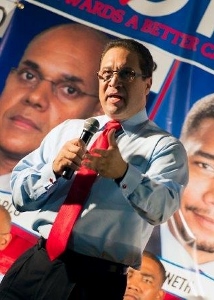Archive for May 3rd, 2013

West Bay Road JR denied
 (CNS): Time was against a local activist attempting to get the courts to intervene in what many consider to be the unlawful closure of the West Bay Road. An application filed by Rupert Ackermon, a member of Truly4Cayman, for a judicial review of the closure was denied by a Grand Court judge Wednesday. Justice Charles Quin said the legal challenge to the NRA agreement between the Dart Realty, the Cayman Islands Government and the National Roads Authority was too late. The first of two legal challenges before the courts was refused purely on the procedural basis, so the legitimacy of Ackermon’s arguments were never even considered, delivering a blow to the opponents of the road closure.
(CNS): Time was against a local activist attempting to get the courts to intervene in what many consider to be the unlawful closure of the West Bay Road. An application filed by Rupert Ackermon, a member of Truly4Cayman, for a judicial review of the closure was denied by a Grand Court judge Wednesday. Justice Charles Quin said the legal challenge to the NRA agreement between the Dart Realty, the Cayman Islands Government and the National Roads Authority was too late. The first of two legal challenges before the courts was refused purely on the procedural basis, so the legitimacy of Ackermon’s arguments were never even considered, delivering a blow to the opponents of the road closure.
Nevertheless, a second legal action which has been filed by four women from the district of West Bay is still going through the legal process via a law suit, giving one more chance for legal intervention to the activists trying hard to stay any further closures, and eventually reclaim the stretc,h which has already been handed over to the islands’ largest developer.
In the 55-page ruling, Justice Quin focused on the delay in filing and stated that Ackermon failed to take the necessary steps to file the application promptly and, as a result, he rejected the application.
The application was filed in the Grand Court via local legal firm Campbells in March of this year after Ackermon finally managed to get funding for the action via a Legal Aid grant. But because it was challenging an agreement signed in December 2011, even though the road was closed just a few months ago, the judge dismissed the application.
Ackermon had claimed that the Cayman Islands constitution, subsidiary laws and natural justice had all been violated with the deal, none of which has been considered because of the untimely filing.
The law provides for only a three-month window of opportunity to apply for judicial review of any decision, and despite Ackermon’s argument that the 15-month delay was down to a catalogue of issues, the judge was not swayed.
The confusion about the initial signing of the December agreement, the various amendments and additions which are ongoing, the secretive nature of the document, which is still not publicly available, and Ackermon’s struggle to find the cash to pay a lawyer, which was eventually funded via legal aid, did not move the judge, who upheld that the timeliness of such applications was critical.
“The court has no difficulty in finding as it has, that the applicant has failed to file his application for leave to apply for Judicial Review promptly,” Justice Quin wrote. He said that the ongoing construction, works contracts for builders, suppliers, employees and developers complicated the matter and supported the lawful requirement for prompt action in such cases.
“I find that if the relief sought by the applicant were granted, at this very late stage, it would cause substantial hardship and prejudice to the respondents and would be detrimental to good administration,” Justice Quin stated in the judgment.
The judge said that there were several points along the way, even without access to the agreement, as a direct consequence of it that the local activists could have moved to file long before the gazetting.
The judge said there were so many compelling reasons to apply "promptly and urgently” in connection with this agreement that he was not convinced that the delay was in any way justified and refused to allow leave on the basis of what he described as a “complete lack of promptness … and excessive and undue delay.”
The legal blow comes two and half weeks away from a general election. The Progressives have stated that if they are returned to office they will seek to renegotiate and reopen the road. However, the UDP and the PNA remain in support of the closure. Although some independents and those running on the C4C ticket have voiced their concerns about the overall agreement, with the exception of the two incumbents of North Side and East End, few others have committed to a re-negotiation.

Joey Ebanks’ court case adjourned until after election
 (CNS): The Grand Court case against North Side candidate Joey Ebanks was adjourned until 14 June in order for both the defence and crown counsels to deal with the various charges against the former MD of the Electricity Regulatory Authority (ERA). Ebanks, who answered his bail in Grand Court, still has more than 20 counts relating to dishonesty in the Summary Court as well as a separate drug related offence, which was also mentioned in Summary Court Friday morning. Several of the dishonesty offences are expected to be committed to Grand Court before his next appearance. Ebanks has continued to vehemently deny the allegations and had continued to claim he is the victim of a corrupt conspiracy because of his efforts to expose corruption.
(CNS): The Grand Court case against North Side candidate Joey Ebanks was adjourned until 14 June in order for both the defence and crown counsels to deal with the various charges against the former MD of the Electricity Regulatory Authority (ERA). Ebanks, who answered his bail in Grand Court, still has more than 20 counts relating to dishonesty in the Summary Court as well as a separate drug related offence, which was also mentioned in Summary Court Friday morning. Several of the dishonesty offences are expected to be committed to Grand Court before his next appearance. Ebanks has continued to vehemently deny the allegations and had continued to claim he is the victim of a corrupt conspiracy because of his efforts to expose corruption.
Ebanks is currently facing a civil suit filed by Dan Scott, the chair of the Judicial and Legal Services Commission (JLSC), and threats of legal action by others, including Cayman Islands Governor Duncan Taylor, as a result of the continued allegations the candidate is making on Facebook and his radio show on vibe FM.

Bank robbers’ evidence scrutinized by five lawyers
(CNS): During his cross examination, robbery accomplice and key witness Marlon Dillon was called on to justify his evidence when he faced a number of questions last week from five different defence attorneys representing the men currently on trial for the armed robbery of Cayman National Bank last June. Dillon's story and his account of the daylight heist were put to the test during a lengthy cross examination. It will be up to the twelve jurors to evaluate the co-conspirator's responses along with the evidence provided by various other witnesses before they hand down their verdict as the end of the trial.
When Dillon took the witness box, the reliability of his interviews and statements were all put to the test and as the crown’s key witnesses in the case, Dillon’s evidence will be critical to the jury’s decision. The twelve men and women heard that in his initial statement Dillon had told the police that the night before the robbery he had been abducted by a group of unknown men, who removed his clothes and threatened to kill him
In his following statements he gave different renditions before he gave a formal police interview to Detective Constable Rachel Johnson.
The various defence counsels all pushed at the inconsistencies and inaccuracies in Dillon's statements, including the sighting of the guns used in the robbery and his recollections of the name of the 'bait', alleged to be Rennie Cole.
In one of his statements, Dillon explained that the first time he had seen the firearms to be used in the robbery was on the morning of the offence at the home of one of the five defendants, David Tamassa, in the back of his pickup truck. The statement was subsequently changed by Dillon to state that he had first seen the gunson that morning in the white Toyota Windham at the Safe Haven meeting spot.
Dillion told the court that his reason for changing the statement and having made a mistake was because he was still afraid for his life.
When questioned by the leading defence counsel for Rennie Cole, Dillon was asked how he was able to “miraculously remember” the name of the person used as the bait during the robbery shortly after DC Johnson appeared in court and witnessed Cole being charged with the offense. Dillon responded by explaining that he'd been thinking about it while in his cell and denied that he was given any assistance by the officers.
It was apparent to the court that Tamassa's name had not been mentioned as being a part of the robbery in one of Dillon's many interviews and when questioned as to why, he seemingly avoided the question and went on to comment, "David was a part of the robbery."
Whilst under cross examination, it was suggested by a few of the defence attorneys that Dillon was only repeating what he was told to say and that his evidence was "scripted" and prepared for him to tell once he was before the court. Dillon also denied this suggestion and continued to repeat his account of what happened on the morning of the robbery at the Buckingham Square branch of the bank.
Dillon said he was sure that the five men who stand in the dock were his accomplices and did not agree that he had given names of less dangerous men instead of the real culprits. However, he insisted he was still afraid for his life and those of his family, who he said were in danger from his co-conspirators.
The court heard that Dillon has been accommodated separately during his time in custody and that there has been discussion with the police about the prisoner, who has admitted his part in the crime, serving his sentence somewhere other than the Northward Prison. Dillon commented, "Why should I serve my sentence in Northward with my co-conspirators when I am cooperating with the police," he told the court.
Andre Burton, George Mignott, David Tomassa, Rennie Cole and Ryan Edwards have all denied being the men who held up the bank on the morning of on 28 June last year and stole around $500,000. Dillon has admitted his part in the crime and is still awaiting his sentencing hearing, which is expected to be dealt with following the verdict of the five men currently on trial for the robbery.
Related articles on CNS:

PPM will end ‘vicious cycle’
 (CNS): The Progressives finally released their full manifesto on Thursday night, just three weeks ahead of the election, setting out its policies and plans if it is elected to government later this month. Although the issue of restoring trust in government is a key theme in the PPM’s bid to return to office, the main thrust behind the party’s plans for office is reducing what it described as the “vicious cycle” of tax increases on the man in the street, which is undermining the country’s recovery. The party is promising to roll back as much of the estimated $200 million tax package, which was imposed by the UDP, as quickly as possible by reducing government expenses. (Photo by Mark Lewis)
(CNS): The Progressives finally released their full manifesto on Thursday night, just three weeks ahead of the election, setting out its policies and plans if it is elected to government later this month. Although the issue of restoring trust in government is a key theme in the PPM’s bid to return to office, the main thrust behind the party’s plans for office is reducing what it described as the “vicious cycle” of tax increases on the man in the street, which is undermining the country’s recovery. The party is promising to roll back as much of the estimated $200 million tax package, which was imposed by the UDP, as quickly as possible by reducing government expenses. (Photo by Mark Lewis)
Although the party has not said which services it will cut, it is pointing to better run and better managed government with less waste, not least excessive travel, badly managed funds, like the unchecked Nation Building Fund, and the haemorrhaging of public funds via statutory authorities, such as the Turtle Farm, in order to reduce fees and taxes. The PPM will start with the duty on fuel, which is seen as the issue impacting the most people and, in turn, the whole economy.
The manifesto was handed out at the end of the Progressive’s public meeting in George Town on Thursday evening, which, despite the rain, attracted hundreds of supporters. During his relatively short address, the party leader, Alden McLaughlin, said that once in office the Progressives would begin the rollback of “life sucking taxes” to drive down the cost of living.
Answering the common allegation that the previous PPM government overspent and left a deficit, McLaughlin pointed out that there was good reason for the spending and no one could have foreseen or prepared for the impact of the global economic crisis. If the PPM government had been at fault, then so were the governments of the world’s leading nations.
“We were criticised for spending too much on education and schools and leaving a deficit but the infrastructure was badly needed,” he said, pointing to years of neglect. “The schools will be there long after all of us have passed on," he said, "Regardless of what they say about us you can see where the money went.”
He also noted that, despite claims by others, the environment in which children are taught is very important in helping them become the best they can all be.
McLaughlin pointed out that the deficit was not caused by the money spent on infrastructure but by the fall in predicted government revenue, an issue that has continued throughout this administration.
Given the controversy surrounding the last UDP government and the mismanagement of public cash, McLaughlin said good governance was not just the right thing to do but was about politicians understanding that the government’s resources don’t belong to elected officials and their friends but they belong to people.
“Everyone knows we are the party of integrity as they saw how we behaved in office,” the PPM leader stated, adding that the cost of greed over the last four years had been devastating.
Talking about the PPM plans and the manifesto, he described it as a people-centred action plan to get country back on track.
Among many issuesset out in the manifesto the PPM details its plans for immigration, which includes enforcing the law, removing the key employing status and the seven year rollover policy to allow all workers who stay for more than eight years to apply for residency and then control the population at that point. It also sets out plans to remove some of the boards so permits are granted administratively based on transparent criteria.
Talking about Dart, the party said it was committed to renegotiating the ForCayman Investment Alliance and to ensure that the major corporation does not continue to squeeze out local businesses, as well as finding a way to retain a through route along the West Bay Road. The party is also committed to keeping the landfill in George Town and dealing with it on site via recycling and waste-to-energy.
From e-government to the implementation of single member constituencies and one man, one vote, the party also promises to revive the mortgage assistance programme and implement the long-awaited national conservation law.
The Progressive manifesto is available from the HQ on Crewe Road and will be posted on the website later today.

Pines boss sacked over missing cash
 (CNS): The manager of the Pines retirement home in George Town has left under a cloud of suspicion following the discovery of financial irregularities in the home's accounts. In a short statement from the board on Thursday it was confirmed that KPMG are undertaking a forensic audit and a report is being prepared for the authorities following the departure of Sue Nicholson. Maples and Calder are assisting in the recovery of the missing funds, officials said. Meanwhile, Nicholson’s husband also released a statement to Rotarians stating that his wife had resigned from the service club in the wake of her dismissal and he was working with the Pines board to ensure any missing money would be returned.
(CNS): The manager of the Pines retirement home in George Town has left under a cloud of suspicion following the discovery of financial irregularities in the home's accounts. In a short statement from the board on Thursday it was confirmed that KPMG are undertaking a forensic audit and a report is being prepared for the authorities following the departure of Sue Nicholson. Maples and Calder are assisting in the recovery of the missing funds, officials said. Meanwhile, Nicholson’s husband also released a statement to Rotarians stating that his wife had resigned from the service club in the wake of her dismissal and he was working with the Pines board to ensure any missing money would be returned.
John Nicolson said he was shocked over the accusations. “It is obviously a very difficult time for my family, but I intend to stand by my wife and if any funds have gone astray I will ensure that every cent is returned to The Pines,” he told the service club at a lunch on Thursday.
The Pines board did not detail how much was missing or under what circumstances but said that the sums involved do not affect the operation of the home and the directors were confident that the losses that have been identified will be recovered.
Lynda Mitchell has assumed the role of interim manager at the home, which provides residential care for over 35 elderly members of the local community.
“Lynda has a wealth of experience in managing residential programs and holds an MBA in global management. Lynda has worked in the Cayman Islands for over 12 years and is well known within the community and Government,” the board said. “The Pines remain committed to providing the best possible care for the elderly and look forwardto the continued support of the local community."
The home is a privately run non-profit facility dependent on charitable donations. Although it also receives funding from government, two thirds of its costs are covered by donations from the private sector. As well as caring for the 35 residents, the home provides a programme for senior citizens who live independently or with their families but require daytime support, as well as temporary respite care for several more.